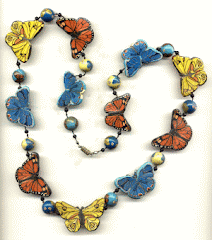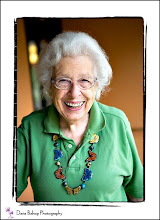 The Sunday Scribblings prompt is "Lost".
The Sunday Scribblings prompt is "Lost".
Jingle Bells had become a problem bear.
He hit Monkey.
He bit Rabbit.
He didn't even speak nicely to the other Teddy Bears.
My son Sterling brought the problem to my attention. Jingle Bells had been given to him about a year earlier when Sterling was three and a half years old. Sterling had named him Jingle Bells because of the bell that was sewn into one ear. Jingle Bells was an otherwise nondescript bear; about nine inches tall, he had probably been pale pink or pale blue when new, but had by this time faded to an indeterminate gray. He was just the sort of bear to be given to the third child in a family of four children by a relative who felt obligated to give a token gift to each.
“Why do you think he's such an unfriendly bear?” I asked Sterling.
“Maybe he duvunt fink I wuv eem.” Sterling said earnestly .
Sterling still had not mastered articulation to keep up with his vocabulary or wit.
“ Maybe you should pay more attention to him. Maybe you should sleep with him instead of with Monkey.”
“I fwep wif eem . He hit me too . An’ I do wuv eem . On’y he duvunt fink I do.”
“Then what do you think he needs?”
It seemed that Sterling had given it serious thought. I listened closely to his difficult-to-understand speech as he explained that Jingle Bells felt that he wasn't as important as the other animals. There was nothing special about him. Nobody noticed him. Maybe I could make some clothes so that he wouldn't feel embarrassed about being naked? I had recently made clothes for several of Candace's dolls and had made Otto Joe's teddy bear a clown costume. I wondered if it were only Jingle Bells who had felt overlooked and neglected.
I sewed a pair of pajamas for Jingle Bells. I used a pair of Sterling’s outgrown pajamas as material (appropriately patterned in tiny Teddy bears) and put on sturdy snaps to make dressing and undressing easy.The little gray bear did look a bit more dapper in his new clothes.
He became a model of bear behavior. He no longer hit or bit. Sterling decided to sleep with him every night.
He did so for the next two years.
Then we started on our first great family adventure - two years living in Brasil. Sterling chose Jingle Bells to accompany him on the Delta liner from New Orleans to Santos, while his other animals had to travel in crates with the rest of our belongings. Every night when we returned to our stateroom, we would find the bedding turned back incitingly. On Sterling's cot Jingle Bells would recline against the pillow, still in no-longer-new pajamas.
For the next six months of 1954 I never gave a thought to Jingle Bells. Immersed in a new community (the faculty housing of a still-in-construction model university designed by the internationally known architect, Oscar NieMeyer), a fascinating foreign culture, the cross-currents of a multi-national faculty in a university run by the Brazilian air ministry, I was alternately exhilarated by the warm Brazilian spirit and depressed by the intransigence of professors families from recently war-torn Europe (ex-Nazis housed next to former resistance fighters, for instance). When would I have time to even notice one small bear returned daily by the maid to his position of honor against the pillow of Sterling's bed? Having a maid was in itself a new experience for me, one fraught with unexpected hazards and complexities.
Gradually Brasil became home to us. Blue and yellow butterflies flitting among the orchids and bromeliads of our garden became familiar (though never unappreciated) sights. We spoke passable Portuguese. We knew the stores of nearby Sao Jose dos Campos - that we should go to certain booths of the market for sanitary meat, that the bakery brought forth fresh loaves at certain hours, that the Fortaleza had Coca Cola on ice and even a small table with chairs where we could sit to drink it before the dusty drive back to the campus. We were unfortunately, familiar even with the local hospital where our youngest son had been hospitalized after a fall.
Weekends were spent exploring the nearby countryside.
We descended the steep escarpment through virgin rain forest to the coastal beaches of Caraguatatuba and Maranduba, warm beaches sheltered by the great bulk of the island, Ilha de Sao Sebastian. I guess Jingle Bells went with us. He must have slept with Sterling in the little six-room hotel that shared the ten-mile stretch of white beach with a few beach cottages.
We explored the mountains to the west of us, strange amalgams of tropical and evergreen coniferous forest with half-timbered European-looking towns and cold unheated rooms in the spotlessly clean hotels. I guess Sterling and Jingle Bells kept each other warm under the starched white bedding of their cot.
It was winter, July, when an academic holiday gave us several free weeks to travel south along the Pan-American Highway, a route that soon proved to exist principally as a line drawn on a map. Where it was existent, it was often a pair of muddy ruts.
Mid-July found us in the state of Santa Catarina and the town of Florianopolis. We had had almost a week of travel through rain, mud, and glorious mountain scenery; the children were restless from the constant confinement in the car. We slept in a hotel in the small mainland portion of Florianopolis; the town was crowded with a political party convention and we were lucky to find a single-windowed room for the six of us, a room where the ox-carts with their groaning wheels creaked by all night. It was the last night in which Sterling and Jingle bells would sleep together.
The following day was a day of sun and wind and sky more blue than I had ever imagined before going to Brasil. We crossed the delicately beautiful cantilevered bridge to Florianopolis proper, which is on the south end of the large island of Santa Catarina. Leaving the town for later exploration, we drove to the beaches on the north end of the island. We parked on a deserted beach and the children spilled out of the doors of the car like pigeons released from a cage. Whitecaps danced on the cobalt water that sparkled with sun-glints from its wind-whipped facets. The tops of the dunes whispered with shifting sand.
The children went wild. They ran. They hid behind sand-dunes and pounced out to startle one another. Spontaneous games erupted. They slid down the steeper dunes. They collected seashells on the edge of the water.
The weather was cold. In spite of the bright sun, our cheeks tingled and then numbed. Finally the cold wind and the thought of a warm lunch convinced even the children that it was time to get back into Hernandez, the 1950 Desoto sedan that had accompanied us from the United States, and to head back to town. We ate lunch. We shopped at the open markets. Eleven-year-old Candace bought narrow hand-made lace for her wedding veil (which did, in fact, edge her wedding veil ten years later).
Then back to the Pan-American highway. With some sense of urgency because we hoped to reach Buenos Aires before the university schedule forced us to turn back, we drove up a relatively well-graded gravel road. It climbed the escarpment on switch-backs through forests of Parana pine, scattered lumberyards, little towns with signs in both Portuguese and German. The children in the back seat slept for hours, it seemed. The sky clouded over, then actual darkness fell. There were stirrings in back.
“Where's Jingle Bells?” Sterling asked suddenly.
The other children helped him search. They shifted jackets and blankets. they looked under seats. Otto Joe found that his knit cap was also missing.
“Do you remember when you last saw Jingle Bells?” I asked.
“Back at the beach. When we were playing pirates. He and I hid together.''
Sterling, big six-year-old that he was, began to cry. “Let's go back! Let’s go back and find him.” If there had been any chance of finding even the right beach let alone the right sand dune, we might have backtracked those many miles and hours that had elapsed since morning. We have done stranger things both before and since. But not only was that chance improbable, but by now Jingle Bells had probably been buried under the constantly shifting sands.
What do you say to a disconsolate six-year-old who, by his own carelessness, has lost his companion of years? Do you tell him to forget it, that it's not important? Do you make up a happy story about what happened? One look at Sterling's woe-begone face was enough to assure me that neither course would be right. At least not yet. Sterling had the look of one who has grieving to do.
So I began a sad story.
Jingle Bells had been having a wonderful time playing on the beach. He liked the hide-and-seek games best. He decided to hide from Sterling. so he scrambled behind a sand dune and waited--and waited--and waited. At first he was excited. Then he began to wonder if Sterling was having trouble finding him. He was beginning to get cold. Finally he changed the game; he would run from behind the dune shouting, "Here I am! Here I am!” Wouldn't Sterling be surprised!
He jumped up and ran down the face of the sand dune. "Here I am!” But a horrible sight met his eyes. Where the deSoto had stood were only empty ruts already beginning to fill with wind-blown sand. They had left him behind!
"Maybe they're on another beach," he thought. "I’1l go look for them.” He trudged up and down dunes, his stubby legs sinking into the sand, getting ever more tired and cold. There was no sign of his family. He did find Otto Joe’s knit cap, which was very heavy for a small bear to lug along with him, but he thought Otto Joe could be grateful when they got together again.
"Maybe I should just wait. I'm glad I have these pajamas to keep me warm. I think I’1l just crawl into Otto Joe’s cap and tuck it around me and rest a little." He fell asleep feeling quite warm and comfortable.
During the rest of our trip we added a bit each day to the saga of Jingle Bells. Sterling himself told how Jingle Bells found a pin and a bit of string with which he fished for food.
Jingle Bells also came across a wooden keg which had washed ashore and proceeded to remodel it into a passable shelter. He used clam shells for dishes. He met some of the local fauna, a capybara and a coati, who were trying to teach him Portuguese. He, in turn, was teaching them English.
“1 wonder if he's still lonesome for me,” said Sterling.
In time we returned to our home in Sao Jose dos Campos and finally, at the end of our two-year contract, we returned to our other home in Berkeley, California. We received much mail from our Brazilian friends or from people with whom we had business dealings. The green and yellow edged letters of the Brazilian airmail envelopes became a familiar and welcome sight.
One day, about a year after our return, I received such an envelope. It was addressed to Senhor Sterling Smith. I assumed it was to me, and I was right. I use the name Phyllis Sterling Smith (Sterling is my maiden name), and the sender had apparently missed the first name and misinterpreted my sex, which was not unusual since my name, Phyllis, is almost unknown in Brazil. That same sender had neglected to put his return address on the back flap of the envelope, the usual spot for it. Best of all, the fragile glue of the envelope flap had come undone so that I could simply lift out the by-now-forgotten communication.
When Sterling came home from school that same day, he found a Brazilian airmail letter waiting for him. It was addressed to Senhor Sterling Smith. The envelope was sealed. The stamp was cancelled, and the date of the cancellation stamp was recent, long after the date of our return to the United States.
On the back flap the return address was that of
Senhor Jingle Bells Smith-ursinho,
Praia de Santa Catarina,
Municipalidade de Florianopolis,
Estado de Santa Catarina,
Brazil.
The letter said:
Dear Sterling,
At last I can write to you! You probably remember that I could neither read nor write when I last saw you.
That awful day on the beach when we became separated I was very lonely. I kept thinking you would find me soon. Then I realized that it was probably my own fault. I shouldn't have hidden from you. Of course it was just a game, but I was young and foolish. I tell my own children to STAY PUT if they get lost. Instead I went looking for you while you were probably still looking for me. Or maybe you thought I had already climbed into the car and didn't find out what had happened until it was too late.
I am writing to thank you for the wonderful childhood I had with you. I was once a very disturbed bear, but you restored my confidence by clothing me in a fine suit of clothes (which is still much admired although much patched) It is the self confidence that your upbringing gave to me that enabled me to survive under difficult circumstances.
My dear wife Maria was left on this beach under much the same circumstances that I was, although much later. The occasion was a family picnic with the family of her owner, whom she remembers almost as fondly as I remember you. Fortunately, by the time I met her I already spoke Portuguese, the only language she speaks. It had been taught to me by good friends here on the praia. They also taught me to read (Portuguese, of course), but I had in my possession a book that I found soon after I was left here. I know it belonged to Otto Joe, because it says on the front that it is the property of the American School, Instituto de Tecnologico de Aeronautica, Sao Jose dos Campos. The book is called Robinson Crusoe.
I hope you do not think that it is dishonest of me to keep it; I would not like to do anything that you would disapprove of. It has been very valuable to me, however, not only in teaching me to read and improve my English but also in its many helpful suggestions as to how to improve my humble abode. Thanks to it, we have running water and other amenities.
Our cozy home (a large barrel with several keg ells) is on the lee side of a sand dune. It faces south to take advantage of solar heating.
I have two fine children, Maria and Jose. When they are a little older I will teach them English.
When I found myself on this beach alone, I was very sad. Now I see that it was all for the best. I am content here with my family. I can't imagine being anywhere else. I owe a lot to you for the training, love, and self-confidence you gave me.
Thank you again and love.
Jingle Bells
Sterling, now a sophisticated third grader, examined the envelope minutely. He seemed torn between belief and disbelief. “You wrote it, of course,” he said grudgingly.
Then he examined the envelope again. “I’m glad he's happy. But you wrote it, of course.”
“Of course,” I said.
Sterling looked at the envelope again. “I’m glad he's not mad at me,” he said.
“But you wrote it, of course.” But he was smiling as a person smiles who has just had a great load of worry and guilt removed from his shoulders.





































